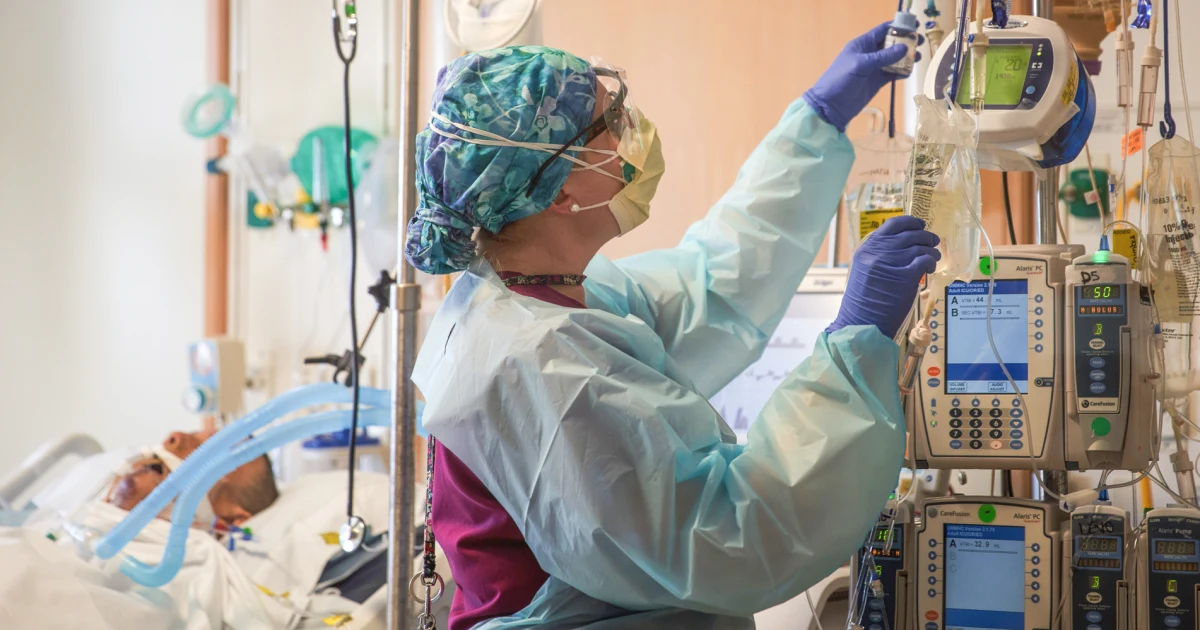The Trump administration’s plan to redefine what constitutes a professional degree would exclude nursing and limit access to student loans — outraging national health care groups and leaving nursing students questioning how they will pay for graduate degrees.
Previously, graduate students could borrow federal loans up to the cost of their degree, but under the new proposal, there would be caps on loans based on whether students are enrolled in a program that is considered professional or not.
The change stems from President Donald Trump’s “one big beautiful bill,” the U.S. Department of Education said in a Nov. 6 news release. Students in graduate programs will now be capped at $20,500 per year with a lifetime limit of $100,000.
For students seeking a professional degree, loan limits are higher, at $50,000 per year, with a lifetime limit of $200,000, the news release states. The Education Department’s list of professional degrees includes pharmacy, dentistry, veterinary medicine, chiropractic, law, medicine, optometry, osteopathic medicine, podiatry and theology.
Undergraduate students will not be affected by the new lending limits.
The American Nurses Association quickly sounded the alarm on leaving nursing out the proposal, saying it will “severely restrict access to critical funding” for students who wish to seek an advanced nursing degree.
The new student loan caps take effect in July 2026.
What is a professional degree?
The Education Department said it uses the term “professional degree” to distinguish between programs that qualify for higher loan limits.
The department said the term does not determine the importance of a program and “has no bearing on whether a program is professional in nature or not.”
However, for many people, the change means that pursuing a master’s or doctoral degree will be more difficult.
“The fact that they are lessening the student loans that you can take out may affect me. It’s frustrating,” said Naimah Brandy, 23.
Brandy, who lives in Columbus, Ohio, said her desire to work in the medical field began as a child when she used to watch shows about the chaotic and high-pressure environment of the emergency room.
She is currently getting her Bachelor of Science in nursing at Chamberlain University and plans to pursue her nurse practitioner’s license after she graduates in 2027.
Brandy said she’s concerned the new loan limit could affect her ability to pursue a graduate degree, but said she won’t let it stop her.
“It kind of just makes me want to, you know, push a little harder,” she said.
Brad Bass, 35, has spent more than a decade documenting his journey through nursing school on his “Nurse Bass” YouTube channel. In October, he was accepted into a certified registered nurse anesthetist program.
He said that he will be affected by the loan cap, but that he began planning and saving for his doctoral program years ago.
“I’ve been working almost 70 hours a week for the past two years,” he said. “Of course, I’m going to have to take whatever federal allotment will be given, and then outside of that, I will be relying on private loans. But that is the reality that I’m faced with. I don’t want to give up on this dream.”
Why is this happening?
Under Secretary of Education Nicholas Kent said in a statement that the change will put pressure on universities to lower their tuition so students don’t have to go into “insurmountable debt to finance degrees.”
Antonia Villarruel, dean of nursing at the University of Pennsylvania, disagrees.
“This is not going to decrease the cost. It’s an expensive program to train, to educate practitioners. The simulated experiences that they have, so they’re not experimenting with patients in the hospital, they do it on dummies, and that all costs,” she said. “We are already looking for efficiencies in what we teach … without compromising quality.”
What does this mean for nursing?
The Education Department said its data shows that 95% of nursing students borrow under the $20,500 annual limit and won’t be affected by the change.
But data published in July by the National Center for Education Statistics said graduate nursing programs cost, on average, more than $30,000 a year.
The American Nurses Association said the groups most affected by the loan cap will be advanced practice nurses, including nurse practitioners, clinical nurse specialists, certified nurse midwives and certified registered nurse anesthesiologists.
Becoming an advanced practice registered nurse requires more extensive schooling that allows them to diagnose patients and prescribe medication, practices outside of the scope of what a registered nurse can do.
Michael Relf, dean of the Duke University School of Nursing, said he worries that the proposal could deter people from seeking advanced degrees.
“If individuals can’t qualify for federal loans, we could predict that a few years down the road, there will be fewer graduates from advanced practice registered nurse programs to be able to enter the workforce,” he said, “which will only add further provider shortage and ultimately delay access to care.”
Since the Education Department’s announcement, the American Nurses Association said over 200,000 nurses and patients have signed its petition demanding the Education Department revise the definition of a professional degree to explicitly include advanced nursing degrees.
The Education Department said the public will have an opportunity to weigh in on this issue before anything is finalized.

